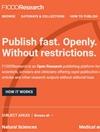Tuberculosis Case Finding Using Self-Assessment Paradigm Through the E-TIBI Application in HIV Patients
Q2 Pharmacology, Toxicology and Pharmaceutics
引用次数: 0
Abstract
Background The goal of eliminating tuberculosis has not yet shown a bright spot. Specifically for HIV patients (PLHIV), WHO has made it a special category as a pillar for eliminating tuberculosis. The tuberculosis screening has not yet reached the national target because it is carried out manually by health workers, requiring optimization following technological developments. This study aims to determine the effectiveness of tuberculosis case finding using a self-assessment paradigm in HIV patients. Methods This research was cross-sectional. The data obtained from HIV patients before and after using the E-TIBI application for 3 months each was analyzed using the compare mean independent t-test. Then the Chi-squared test was carried out on the E-TIBI screening characteristic variables. Result In total, there were 921 respondents with 148 (16%) presumptive TB. It was found that there was a significant difference (p<0.05) in the number of presumptive TB cases found in HIV patients before and after using the E-TIBI application. The person with presumptive TB showed 20 of 24 characteristic variables that were statistically significant (p<0.05). Conclusion E-TIBI can increase the tuberculosis case finding in HIV patients so it has the potential to be implemented as a screening tool in the PLHIV community.通过 E-TIBI 应用程序在艾滋病患者中使用自我评估范式查找结核病例
背景 消除结核病的目标尚未出现亮点。世卫组织将艾滋病毒感染者(PLHIV)列为特殊群体,作为消除结核病的支柱。结核病筛查尚未达到国家目标,因为它是由卫生工作者手工进行的,需要随着技术的发展进行优化。本研究旨在确定在艾滋病患者中使用自我评估范例进行结核病病例发现的有效性。方法 本研究为横断面研究。使用 E-TIBI 应用程序前后各 3 个月的艾滋病患者数据采用比较均值独立 t 检验进行分析。然后对 E-TIBI 筛查特征变量进行卡方检验。结果 共有 921 名受访者,其中 148 人(16%)推定患有肺结核。结果发现,在使用 E-TIBI 应用程序前后,艾滋病病毒感染者中发现的推定肺结核病例数存在显著差异(P<0.05)。推定肺结核患者的 24 个特征变量中有 20 个具有统计学意义(P<0.05)。结论 E-TIBI 可以增加艾滋病毒感染者的结核病例发现率,因此有可能作为一种筛查工具在艾滋病毒感染者社区中使用。
本文章由计算机程序翻译,如有差异,请以英文原文为准。
求助全文
约1分钟内获得全文
求助全文
来源期刊

F1000Research
Pharmacology, Toxicology and Pharmaceutics-Pharmacology, Toxicology and Pharmaceutics (all)
CiteScore
5.00
自引率
0.00%
发文量
1646
审稿时长
1 weeks
期刊介绍:
F1000Research publishes articles and other research outputs reporting basic scientific, scholarly, translational and clinical research across the physical and life sciences, engineering, medicine, social sciences and humanities. F1000Research is a scholarly publication platform set up for the scientific, scholarly and medical research community; each article has at least one author who is a qualified researcher, scholar or clinician actively working in their speciality and who has made a key contribution to the article. Articles must be original (not duplications). All research is suitable irrespective of the perceived level of interest or novelty; we welcome confirmatory and negative results, as well as null studies. F1000Research publishes different type of research, including clinical trials, systematic reviews, software tools, method articles, and many others. Reviews and Opinion articles providing a balanced and comprehensive overview of the latest discoveries in a particular field, or presenting a personal perspective on recent developments, are also welcome. See the full list of article types we accept for more information.
 求助内容:
求助内容: 应助结果提醒方式:
应助结果提醒方式:


